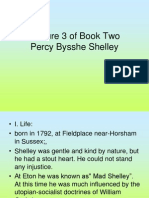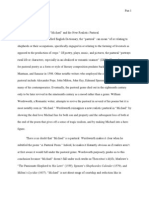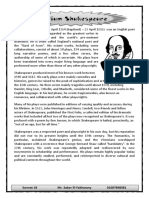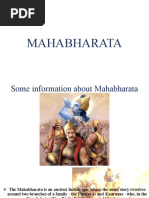1 - Pope - An Essay On Criticism
Uploaded by
Sarha Fiorenza1 - Pope - An Essay On Criticism
Uploaded by
Sarha FiorenzaTHE AGE OF ENLIGHTENMENT (1700 - 1760)
NATURE, IMAGINATION AND EGOTISM
ALEXANDER POPE
(1688 - 1744)
1. BIOGRAPHY
Pope is considered as the greatest poet of the Classical period. Pope born in London, in a Roman
Catholic’s family, this affected not only his verse and critical principles but also his life. In the year
of his birth occurred the so-called “Glorious Revolution”: England’s Catholic monarch James II
was displaced by the Protestant King William III of Orange, and the prevailing anti-Catholic laws
was annulated. This affected many aspects of Pope’s life: he could not obtain a university
education, hold public or political office, or even reside in London. Pope’s family, in fact, moved to
a small farm occupied by other Catholic families. Also, Pope’s personal life was afflicted by
disease: he was a hunchback, only four and a half feet tall, and suffered from tuberculosis. He was
in constant need of his maid to dress and care for him. Speaking of himself he will say "this long
illness, my life". However, he privately taught through tutors: he studied the great Latin and Greek
works, as well as modern languages, creating an education on the literary piano and moved in an
elite circle of London writers. As a boy, Pope was a keen reader and very talented. His first
publication, The Pastorals, included works written while he was very young. The mock epic “The
Rape of the Lock” made Pope known to a general audience. Here, he critics the narrow-
mindedness and frivolity of the English aristocracy.
AN ESSAY ON CRITICISM (1711)
An Essay on Criticism, is a didactic poem in heroic couplets by Alexander Pope, first published
anonymously in 1711 when the author was 22 years old. It’s an essay in which he exposes the
neoclassical literary theory. It is divided into three parts: thesis, antithesis, and synthesis.
Despite the title, the poem is not a critical analysis but a series of Pope's advice on literature.
It is a sort of Enlightenment Manifesto. Both Poets and critics are expected to follow Nature
because Nature does not make any mistakes. Here, Pope gives an idea to his contemporaries of
how to write and how to judge a piece of art, and not just art but a piece of literature.
Pope feels that writers should emulate ancient works and only bend the rules once they establish
their skills as writers. According to Pope both critics and writers must be humble before the rules
created and followed by the ancients. Critics should not harshly judge works of literature without
knowledge of these rules and acceptance of their importance.
1) NATURE:
The first of the three sections of the poem open with the argument that good taste comes from
Nature and that critics should imitate the ancient rules established by classical writers. Moreover,
he declines the Baroque pomposity in favour of natural, essential works. We have to underline that
we are in 1711 -> Augustan Age and the beginning of Enlightenment movement. The
Enlightenment is against the Baroque movement (symbol of excess), while Nature does not fail, it
is right, and it is the mirror of Reason. First follow Nature’ was Pope’s battle cry. The artist should
follow Nature and only make simple additions. Pope is against excess of wit and in favour of clear
thoughts expressed in simple and easy language. Any art which fails to reflect nature is not worth
to call an art at all. This makes him a classic because neoclassical art tends towards the whole, it
does not matter the intensity of the particular but the harmony of the whole.
Nature is considered as superior entity to which everyone must obey >THEISM. The term “natural
religion” is sometimes taken to refer to a pantheistic doctrine according to which nature itself is
divine. The poet focuses on the characteristics of nature (centre of Enlightenment):
CLEAR – UNCHANGED – UNIVERSAL LIGHT – SYMBOL ORF ORDER AND PERFECTION
– IT PROVIDES
1. Clear ARTISTIC MODELS TO FOLLOW - NATURE IS IDENTICAL TO HUMAN
REASON.
METAPHOR OF WINGED COURSER:
It refers to the imagination, which is influenced by reason, it is not free. Inspiration and imagination
cannot be leave very free, but they have to be kept under Reason control. The poet has to try to
find a balance and control the fury of imagination. The horse is without guide like the imagination:
the horse needs to be guided by the winged coursed, as the imagination has to be controlled by
the Reason.
In Alexander Pope the central idea is the Equilibrium. His major model was Horace, which Pope
successfully imitated in his elegant heroic couplets. To copy the ancients is to copy Nature. ‘
ALEXANDER POPE: AN ESSAY ON CRITICISM (1711)
IMPERATIV FORM Part I - ll. 59-77
First follow Nature, and your judgement frame
By her just standard, which is still the same: Prima segui la Natura, e forma la cornice del tuo giudizio
Unerring Nature, still divinely bright, Secondo il suo giusto modello, che è ancora lo stesso:
L’infallibile natura, ancora divinamente luminosa,
One clear, unchanged, and universal light,
Una luce chiara, immutata e universale,
Life, force, and beauty must to all impart, Vita, forza e bellezza deve impartire a tutto,
At once the source, and end, and test of art. In una volta sola sorgente, fine e prova dell’arte.
Art from that fund each just supply provides,
Works without show, and without pomp presides. Arte da quel fondo ogni fornitura giusta fornisce,
In some fair body thus the informing soul Opere senza spettacolo, e senza sfarzo presiede:
With spirit feeds, with vigor fills the whole, In qualche bel corpo così l'anima informatrice
Di spirito si nutre, di vigore riempie il tutto,
Each motion guides, and every nerve sustains;
Ogni movimento guida e ogni nervo sostiene;
Itself unseen, but in the effects remains.
Di per sé invisibile, ma negli effetti, rimane.
Some, to whom Heav’n in wit has been profuse,
Want as much more, to turn it to its use; Alcuni, ai quali il cielo è stato profuso in arguzia,
For wit and judgment often are at strife, Vuoi tanto di più, per volgerlo al suo uso;
Though meant each other’s aid, like man and wife. Perché l'arguzia e il giudizio sono spesso in conflitto,
'Tis more to guide, than spur the Muse's steed; Anche se significava l'aiuto reciproco, come uomo e moglie.
Restrain his fury, than provoke his speed; È più per guidare, che spronare il destriero della Musa;
Trattenere il suo furore, che provocarne la velocità;
The winged courser, like a gen’rous horse,
Il corso alato, come un cavallo generoso,
Shows most true mettle when you check his course. Mostra il più vero coraggio quando controlli il suo corso.
You might also like
- Halloween Esl Vocabulary Word Search Puzzle Worksheet For Kids PDF67% (3)Halloween Esl Vocabulary Word Search Puzzle Worksheet For Kids PDF2 pages
- On First Looking Into Chapman's Homer by John Keats100% (1)On First Looking Into Chapman's Homer by John Keats4 pages
- An Analysis and Interpretation of Keats Endymion PDFNo ratings yetAn Analysis and Interpretation of Keats Endymion PDF241 pages
- Biograaphi A Literia: Rija Qamar Roll No 04 Mam Noor 19-01-2023No ratings yetBiograaphi A Literia: Rija Qamar Roll No 04 Mam Noor 19-01-20238 pages
- Attempt A Critical Appreciation of The Triumph of Life' by P.B. ShelleyNo ratings yetAttempt A Critical Appreciation of The Triumph of Life' by P.B. Shelley3 pages
- Comparison Between Shelley and Keats andNo ratings yetComparison Between Shelley and Keats and8 pages
- " Thou Hast Made Me, and Shall Thy Work Decay?No ratings yet" Thou Hast Made Me, and Shall Thy Work Decay?2 pages
- Paradise Lost Character of Satan by Neha KhalidNo ratings yetParadise Lost Character of Satan by Neha Khalid3 pages
- Pomegranates Series, Were For The Most Part Unsuccessful. Nevertheless, The Techniques He Developed Through His Dramatic MonologuesNo ratings yetPomegranates Series, Were For The Most Part Unsuccessful. Nevertheless, The Techniques He Developed Through His Dramatic Monologues36 pages
- Biographia Literaria by St Coleridge (1)No ratings yetBiographia Literaria by St Coleridge (1)14 pages
- Acfrogazaje74gcyeglc4xqsaswjm847dqttjpz Evdto0ubgyg9bs10jyx2prpvnq1gc 5lak8hjzqcr - Virdgtzgpzyjs6kdhs 4l0z Sttyqhhu1scm38ducjqvizbckkndckwkyjqoku4mmNo ratings yetAcfrogazaje74gcyeglc4xqsaswjm847dqttjpz Evdto0ubgyg9bs10jyx2prpvnq1gc 5lak8hjzqcr - Virdgtzgpzyjs6kdhs 4l0z Sttyqhhu1scm38ducjqvizbckkndckwkyjqoku4mm20 pages
- "A Poison Tree" by William Blake: Summary and AnalysisNo ratings yet"A Poison Tree" by William Blake: Summary and Analysis6 pages
- Lecture - 8 Preface To Fables Dryden Evaluation of ChaucerNo ratings yetLecture - 8 Preface To Fables Dryden Evaluation of Chaucer4 pages
- "Michael" and The New Realistic PastoralNo ratings yet"Michael" and The New Realistic Pastoral10 pages
- William Shakespeare (26 April 1564 (Baptised) - 23 April 1616) Was An English PoetNo ratings yetWilliam Shakespeare (26 April 1564 (Baptised) - 23 April 1616) Was An English Poet6 pages
- 4 - Coleridge - The Rime of Ancient MarinerNo ratings yet4 - Coleridge - The Rime of Ancient Mariner5 pages
- The Aristotelian Perspective in Otakar Zich's The Aesthetics of Dramatic Art PDFNo ratings yetThe Aristotelian Perspective in Otakar Zich's The Aesthetics of Dramatic Art PDF14 pages
- MDSA01 - Syllabus - Summer 2020 - Final - SLK-1No ratings yetMDSA01 - Syllabus - Summer 2020 - Final - SLK-113 pages
- PHAEDRA - PLAY SUMMARY & ANALYSIS - Seneca The YoungerNo ratings yetPHAEDRA - PLAY SUMMARY & ANALYSIS - Seneca The Younger11 pages
- Culture Is the Way: How Leaders at Every Level Build an Organization for Speed, Impact, and Excellence Matt Mayberry - The ebook in PDF and DOCX formats is ready for download now100% (2)Culture Is the Way: How Leaders at Every Level Build an Organization for Speed, Impact, and Excellence Matt Mayberry - The ebook in PDF and DOCX formats is ready for download now52 pages
- Romeo and Juliet L15 - Banishment PowerPointNo ratings yetRomeo and Juliet L15 - Banishment PowerPoint11 pages
- Oumh1203 English For Written Communicatio2100% (2)Oumh1203 English For Written Communicatio214 pages






























































































